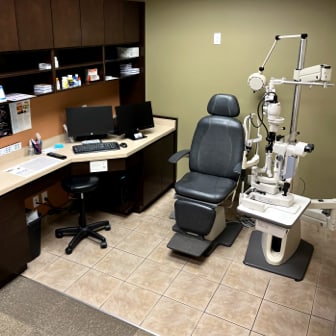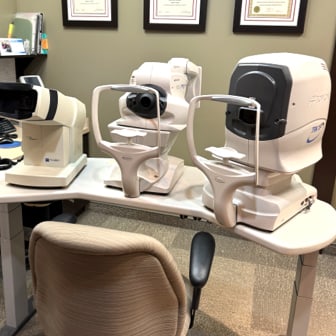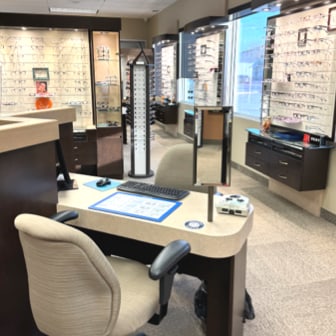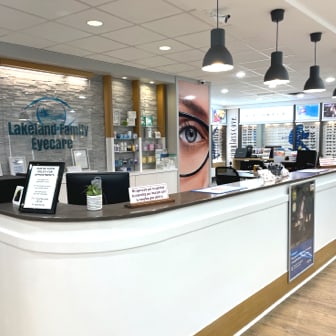
Protect Your Eyesight & Ocular Health
Many eye diseases can lead to vision impairment, vision loss, or blindness. Even if you have 20/20 vision and no obvious symptoms, you may have a severe eye condition that requires treatment.
Many causes of vision loss are preventable with timely access to quality eye care. Even the leading causes of severe vision impairment, cataracts, diabetic retinopathy, glaucoma, and macular degeneration, can be managed to support your quality of life.
At Lakeland Family Eyecare, we aim to provide accurate diagnoses and treatments for various vision-threatening diseases.

Comprehensive Eye Exams Are Key to Managing Eye Health
We provide thorough eye disease testing with innovative diagnostics and tried-and-true techniques for patients of all ages.
By regularly conducting eye exams, we can closely monitor your eye health, so we can detection and monitor any changes or early signs of disease.
Glaucoma: The Silent Thief of Sight
Glaucoma is a group of chronic eye diseases that cause progressive damage to the optic nerve. It typically develops with no symptoms in the early stages, and can severely impair vision, leading to complete blindness if untreated.
Although the exact cause of glaucoma is unknown, glaucoma is generally associated with increased internal eye pressure.
We use several technologies to test for glaucoma, including digital retinal photography and the Topcon Maestro OCT. These technologies, which help us detect the earliest signs of glaucoma, are included in our comprehensive eye exam.
Types of Glaucoma
There are many types of glaucoma, but the main 3 are:
- Open-Angle: This is the most common form of glaucoma. Open-angle glaucoma occurs when the eyes’ drainage canals gradually become inefficient over time, resulting in increased eye pressure.
- Angle-Closure: Also referred to as closed-angle or narrow-angle glaucoma, angle-closure glaucoma is a medical emergency. It’s caused by a sudden rise in eye pressure due to the angle between the iris and cornea closing.
- Normal-Tension (NTG): With this type of glaucoma, the optic nerve becomes damaged even though internal eye pressure remains in the normal range.

Age-Related Macular Degeneration (AMD)
Macular degeneration, also referred to as age-related macular degeneration (AMD), is the progressive deterioration of the macula, the part of the retina responsible for detailed central vision. As the name indicates, AMD is commonly related to the aging process and is the leading cause of blindness in North Americans over 55.
Types of AMD
Patients can have one or both of the following types of AMD.
Dry macular degeneration (non-neovascular) is identified by yellow deposits known as that form on the macula. These drusen deposits grow in mass and quantity over time, dimming and distorting the patient’s vision. Dry AMD has the potential to advance to wet AMD.
Wet macular degeneration (neovascular) is the more advanced type of AMD and presents in the later stages of the disease. Wet AMD is caused by the formation of abnormal blood vessels beneath the retina. These are weak and end up leaking blood and other fluids into the eye, distorting and blurring central vision.
Cataracts
A cataract is a clouding of the eye’s natural lens. Light rays that travel into the eye are focused through the lens onto the retina. As the lens clouds, light is diffused and cannot properly focus on the retina, impacting vision and eyesight.
According to the CNIB, over 3.5 million Canadians have cataracts. Cataracts are common in Canadians over 60, and in most cases are easily treated. There is no need to suffer from vision loss due to cataracts. Cataract treatments are well studied and proven to be highly successful.
Flashes
Spots of light in your field of vision are known as flashes. They’re not caused by anything outside the body, but by physical pressure placed on the retina, the light-sensitive tissue on the back of the eye.
Many people will experience flashes sporadically throughout their lives. Most flashes are nothing to worry about and are a natural part of aging.
However, flashes can indicate an issue that needs immediate attention if they’ve increased in frequency and quantity.
Sudden onset of eye flashes or floaters may indicate:
- Retinal bleed from diabetes or eye disease
- Retinal tear or detachment
An optometrist should always investigate any abnormal changes to your eyesight.
Floaters
Have you ever noticed dark specks shaped like dots, dark spots, squiggles, or cobwebs that seem to move away when you try to look at them?
These are known as floaters. They are most visible when you look at bright backgrounds, such as a clear blue sky or snow on a sunny day.
Floaters move as your eye moves, creating the illusion of floating shapes in your vision. But they’re actually shadows from cells in the vitreous, the gel-like fluid inside your eye.
Floaters are usually harmless, but a sudden appearance or increase in number can indicate an serious eye condition.

Conjunctivitis (Pink Eye or Red Eye)
Conjunctivitis can be highly contagious. Most patients are not aware of the type of pink eye they have and risk infecting others. There are 3 primary types of conjunctivitis, all of which we are equipped to treat onsite.
You may experience one or more of the following symptoms:
- Discharge that crusts over the eyelashes (particularly after a night’s sleep)
- Burning, gritty sensation
- Itchy or irritated eyes
- Blurred vision
- Redness of the white of the eye & inner eyelid
- Excess amount of tears

Book Your Eye Care Appointment Today
Treatment is most effective when eye disease is detected and diagnosed early. This proactive step starts with a comprehensive eye exam. Please call us today and book your appointment!

Our Brands







Find Us In Bonnyville & St. Paul
Bonnyville
On the corner of Main & 52nd St, across from Westline Autowash.
As you may already be aware, Alberta Health Services has recently cut back coverage on optometry services. These changes were unexpected. We are extremely disappointed with their decision and how they handled bringing about this change.
To maintain the high quality of care that you have come to expect at our clinic, there will now be a fee for most eyecare services that were previously fully covered by AHS. If you would like to know how this affects you, please call our clinic at 780-826-4437 and one of our team members would be happy to assist you. You are also welcome to contact your local MLA to voice any concerns you may have with these changes in coverage.
Thank you for your understanding and your continued support.
- 5201 50 Avenue
- Bonnyville, AB T9N 2G6
- Phone: 780-826-4437
- Fax: 780-826-4267
- Monday: 8:00 AM – 5:00 PM
- Tuesday: 8:00 AM – 8:00 PM
- Wednesday: 8:00 AM – 8:00 PM
- Thursday: 8:00 AM – 5:00 PM
- Friday: 8:00 AM – 2:00 PM
- Saturday: Closed
- Sunday: Closed
St. Paul
You can find us on 51st Avenue, next to the Fire Hall.
As you may already be aware, Alberta Health Services has recently cut back coverage on optometry services. These changes were unexpected. We are extremely disappointed with their decision and how they handled bringing about this change.
To maintain the high quality of care that you have come to expect at our clinic, there will now be a fee for most eyecare services that were previously fully covered by AHS. If you would like to know how this affects you, please call our clinic at 780-645-3790 and one of our team members would be happy to assist you. You are also welcome to contact your local MLA to voice any concerns you may have with these changes in coverage.
Thank you for your understanding and your continued support.
- 4916 51 Avenue
- St. Paul, AB T0A 3A0
- Phone: 780-645-3790
- Fax: 780-645-2830
- Monday: 8:00 AM – 5:00 PM
- Tuesday: 8:00 AM – 8:00 PM
- Wednesday: 8:00 AM – 8:00 PM
- Thursday: 8:00 AM – 5:00 PM
- Friday: 8:00 AM – 2:00 PM
- Saturday: Closed
- Sunday: Closed

Our Blog
MacuMira: A New, Innovative Treatment for Dry AMD
Dry AMD, MacuMiraIf you’ve been diagnosed with dry age-related macular degeneration (AMD), you know how frustrating it can be when reading becomes harder or faces start looking blurry. You may feel limited in your options, especially if you want to maintain your independence and enjoy daily activities. Lakeland Family Eyecare understands these challenges and offers innovative solutions […]
Read More… from MacuMira: A New, Innovative Treatment for Dry AMD
Pink Eye vs Stye: What’s the Difference?
Eye Conditions, Eye HealthA red, swollen, and uncomfortable eye can be alarming, and it’s common to wonder what’s causing the irritation. Many people confuse pink eye and styes because they share similar symptoms, but they are very different conditions. Often, other issues are mistaken for pink eye, which is why a proper diagnosis is so important. The key […]
Eye Is Hurting when I Blink: 5 Possible Causes and When to See a Doctor
Eye Care, Eye Exams, Eye HealthFeeling a sharp pain or discomfort every time you blink is hard to ignore. It can make it difficult to focus on work, read, or even just relax. If your eye hurts when you blink, it could be a sign you need emergency eye care, and you’re likely looking for answers. The discomfort often comes […]
Read More… from Eye Is Hurting when I Blink: 5 Possible Causes and When to See a Doctor
MacuMira: A New, Innovative Treatment for Dry AMD

If you’ve been diagnosed with dry age-related macular degeneration (AMD), you know how frustrating it can be when reading becomes harder or faces start looking blurry. You may feel limited in your options, especially if you want to maintain your independence and enjoy daily activities. Lakeland Family Eyecare understands these challenges and offers innovative solutions […]
Read More… from MacuMira: A New, Innovative Treatment for Dry AMD
Pink Eye vs Stye: What’s the Difference?

A red, swollen, and uncomfortable eye can be alarming, and it’s common to wonder what’s causing the irritation. Many people confuse pink eye and styes because they share similar symptoms, but they are very different conditions. Often, other issues are mistaken for pink eye, which is why a proper diagnosis is so important. The key […]
Eye Is Hurting when I Blink: 5 Possible Causes and When to See a Doctor

Feeling a sharp pain or discomfort every time you blink is hard to ignore. It can make it difficult to focus on work, read, or even just relax. If your eye hurts when you blink, it could be a sign you need emergency eye care, and you’re likely looking for answers. The discomfort often comes […]
Read More… from Eye Is Hurting when I Blink: 5 Possible Causes and When to See a Doctor















